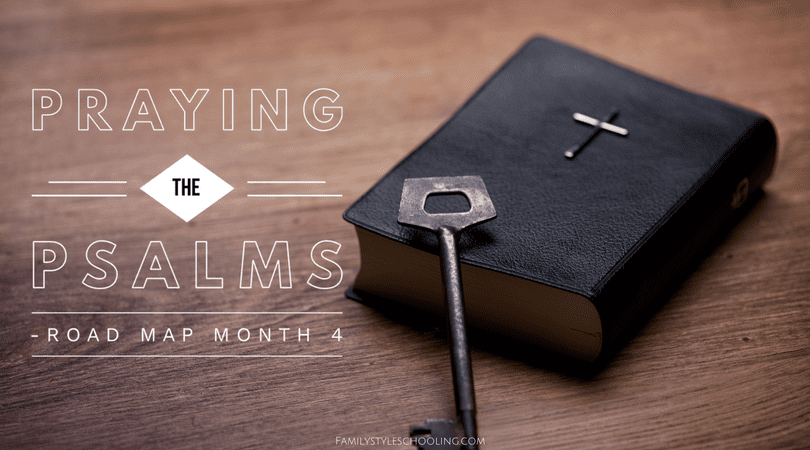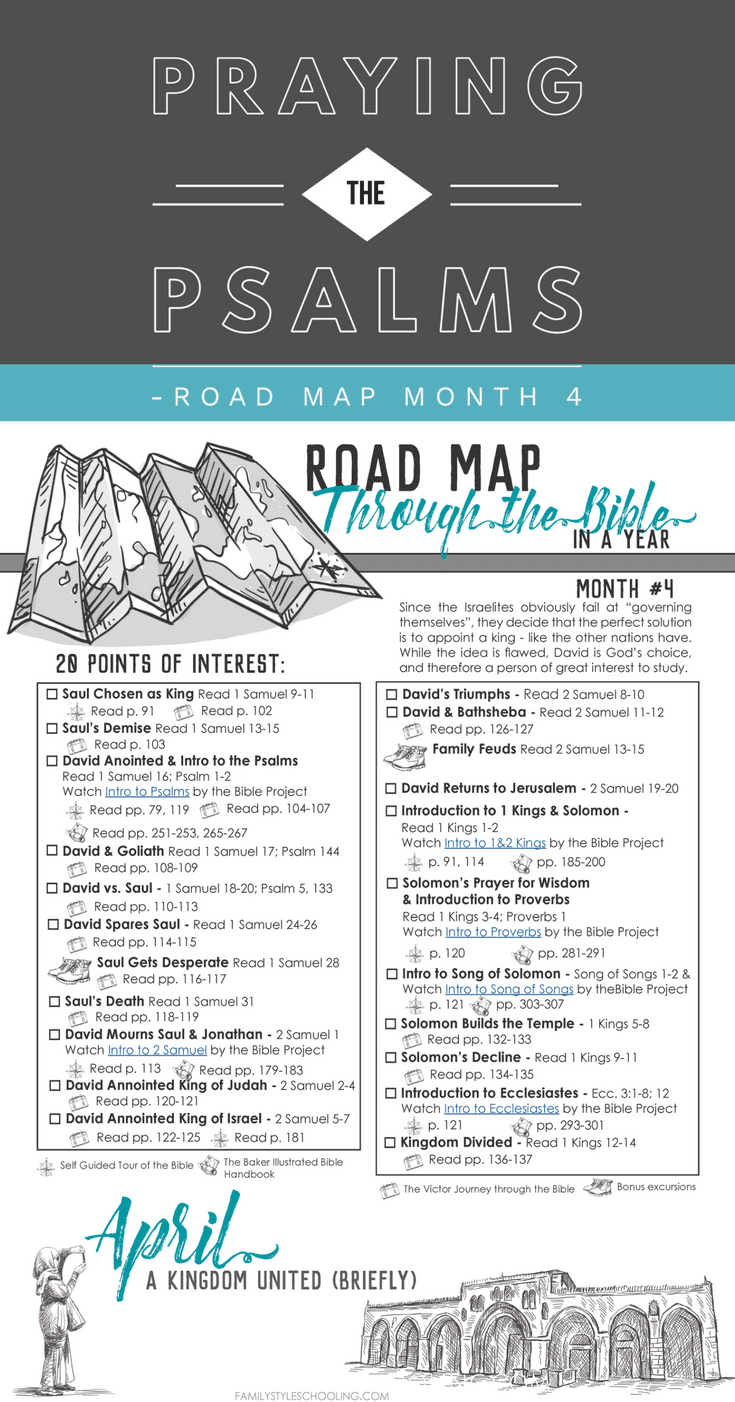Praying the Psalms – Road Map Month 4
Hearing the story of the Israelites hasn't become easier now that they're in the Promised Land. If you've been reading through *most of the Bible in a year with us, you might be feeling the same way. Even in times of peace, the people can't keep their promises without someone making them keep their word.
The next twenty points of interest cover the introduction of a earthly king to govern God's people. But they already had a King. Why were they looking for a replacement for the King of kings?
When Saul is crowned King, things don't go quite as planned. It's not until David, a man after God's own heart, takes the throne that there is true peace in the land. However that peace comes at a cost and brings with it trouble of its own. It is getting clearer with each chapter that we read that we need a Savior. We can't escape this sin pattern on our own.

If you're just here to download the next installment of the Road Map Through the Bible, you can get that here! I encourage you to continue reading about praying the Psalms.
One beautiful way of submitting our desires to God's is praying His Words back to him. I've asked my husband to share about this powerful practice today. I hope you're as encouraged by this idea as I have been:

In light of this, I want to give you five reasons why you should pray the Psalms.
How to Pray the Psalms

5 Reasons Why You Should Pray the Psalms
1. They are God's words
One of the best parts of praying God's Word is that they are God's words, not yours. Many times we do not realize that our words contain hidden agendas and complaints. If you use the very words you see, you can know that they are God-breathed already and righteous. Jesus Himself prayed and spoke the Psalms fluently. The apostles were also saturated with them. They prayed them together and sang them together. In fact, the Psalms are used over 400 times in the New Testament. They knew that these were God-centered words because they were God-inspired words, not fleshly motivated ones.
2. They are worshipful words
The words of the Psalms take our prayers out of a gray, myopic vision of life into the colorful, expansive world of God's greatness. The very words of the Psalms reach up on their tip-toes to touch the glory of God. His deeds are wondrous and the words of the Psalms fill your mouth with His praise. Words of worship can teach your heart its place, for "the heart is deceitful above all things, and desperately sick" (Jer 17:9). Sometimes you don't realize just how arrogant and self-centered your words are - even in your prayers. When you pray for others, it helps you keep the right perspective.
3. They are Emotional Words
The very words of the Psalms need no help on the scale of emotion. They teach us how to pray with emotion - appropriate emotion. There is humility even in the deepest grief and in the highest joy. The words reflect a profound humanness like a realistic painting. They are songs of the heart which masterfully weave the harmony of the divine perspective with the dissonance of suffering. The Psalms carry words of despair and anger as well as words of peace and joy. The whole range of very real human emotion finds its home in the very words of the Psalms. So when you learn to say these words in your prayers for others, you learn to put yourself in their shoes.
4. They are Rational Words
Emotion, however, does not run amok in these words. They are tempered by a kind of focus in every Psalm. With clear structure, the psalmists convey clear (albeit poetic) meaning, and very purposeful questions. These timeless words are invaluable for balanced thinking and rational processing of requests and circumstances.
In Psalm 86, he says, "Make glad the soul of Your servant." And then, as if to give the reason for the request, he says, "For to You, O Lord, I lift up my soul." Why? "For You, Lord, are good, and ready to forgive, and abundant in loving kindness to all who call upon You." It's a very rational thought process, and sometimes we I need help with that. Then, I'll be more likely to stay focused when I pray for others.
5. They are Relational Words
Without a doubt, the words of these Psalms are potently written to express himself to his Creator, but not only for himself. Every Psalm is for a kind of remembrance. The stories they tell are to be remembered among a people who had been chosen by God. They were to remember His deeds. They were to remember how they should respond to God, to each other, and to enemies. In a word, to remember their relationships. These words help us remember where we came from and who we are. They help us remember who God is and to hope in His grace and mercy. They help us remember there are consequences to our actions and that relationships are hard work. It helps you be compassionate when you pray for others.

Pray for your kids with the inspired words of God that David, a man after God's own heart, wrote. If we learn anything from reading through the Old Testament, we should learn that we can easily be led astray by the desires of the world. God's Word keeps us anchored to Truth.
Want the Rest of the Plan?
Click on the links below to read more about our complete reading plan. Start wherever you'd like to jump in!
- Month 1 - Beginnings
- Month 2 - Exodus
- Month 3 - Joshua to Judges
- Month 4 - Kingdom United
- Month 5 - Divided Kingdom
- Month 6 - Judah Falls
- Month 7 - Exile and Return
- Month 8 - Birth & Ministry of Christ
- Month 9 - Death & Resurrection of Christ
- Month 10 - Pentecost & the Early Church
- Month 11 - Beginning of the End
- Month 12 - Follow your favorite Advent program to review!


